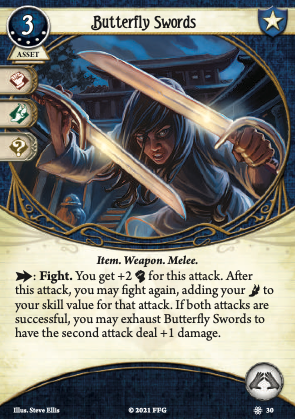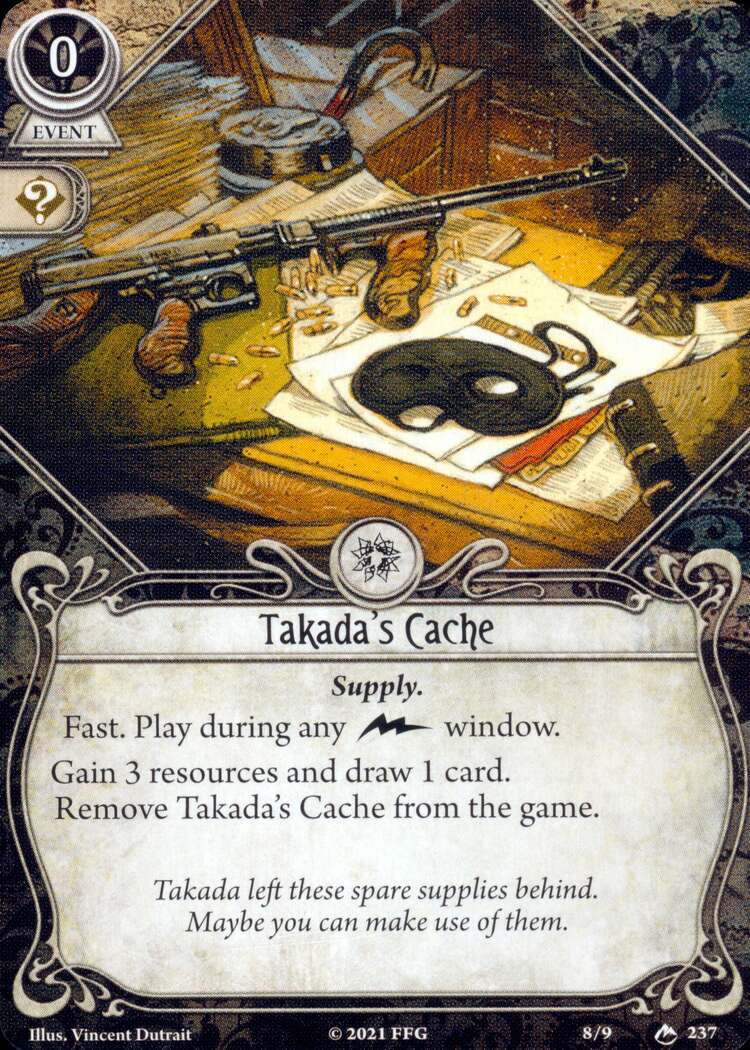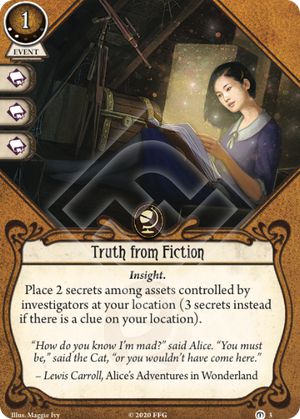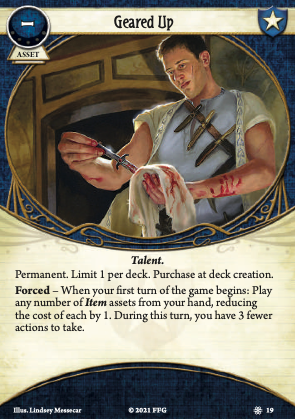
This weapon is bad, and there are a few reviews that say it is, but it is hard to understand just how... amazingly terrible this weapon is. On first blush it is just not that good but it is actually far more insidious than that.
To understand why this is such an amazingly bad weapon, you need to do my favorite thing: Lots of math!
Drawing from the bag a lot of times to achieve an effect is, in Arkham, a bad thing to do. This isn't intuitive, there are many games where "Make 3 tests to do 1 damage 3 times" is actually better than "Make 1 test to do 3 damage." Arkham is not one of those games.
When making attacks with the swords, you test twice. One is probably an auto-success if the other has any chance of success, which means your expecting about a 7% to 4% autofail on one, and 25% fail rate on the other (say... you have 7 total combat strength vs a 5 fight enemy). This means your expected damage comes out to about 5 expected damage when swinging this thing around in a fairly standard situation to be in, which makes it not even a full +1 damage weapon. You are just flatly better off using a weapon with a stronger hitrate boost than a +2 in this scenario, as well as making your attacks hit harder than a mere +1, rather than trying to play into some weird sort of consolation prize for failing while also failing more. After all, you can make up for lost damage on fails way more easily by doing double the damage AND failing less, rather than attacking twice as often.
And your reward for probably being worse than a neutral 1 handed weapon in output is... producing more scenario specific negative tokens. Assuming there are 2 tokens you really don't want to draw for their own sake in a 15 token bag (which is pretty standard for arkham early to mid campaign), you will see one of those really bad tokens 43% of the time. This is probably the best you can expect, but it can get much, much worse.
Just a little example that minimizes spoilers: In Carcosa's first scenario, if you are trying to push past an enemy in a room affected by the scenario, you can expect to take 2 horror every turn you fight with these (not to mention it is a scenario with a -4 symbol). Obviously you can't have the swords at this scenario, but if you hypothetically had the butter knives right now, you probably would completely kill yourself from full health as most guardians after 3 turns of fighting.
And this is just the tip of the iceberg: Spawning enemies, placing doom, losing clues (though obviously that last one is less of a concern for guardians), losing assets, enemies healing, enemies damaging friends, losing actions, all of these things and more can happen on token draws and more! The terrors trying to do kung fu will bring you cannot be understated, and it is why this weapon is so amazingly bad: Not only does it make you worse at fighting than pretty much any other XP weapon that doesn't have a taboo (and probably most 0 XP in guardian) but it makes the game harder for everyone as your turn partially becomes Arkham Horror's turn.
This is why 'purely benign' skill cards like Alchemical Transmutation are considered bad if their upshot isn't strong enough: Merely drawing from the bag for a skill test is a downside even if the listed consequence for failure is 'nothing' often enough. Even rogues don't generally set themselves up for lowball 'nothing' tests.
"But what if the first attack would generally hit?" If the first test would generally pass anyway, you absolutely should be using a different weapon. The only advantage of the swords is to make it virtually guaranteed you will do 1 damage vs enemies you have a harder time hitting. If you are fairly sure you will hit anyway, you hurt yourself any time you are not stabbing a rat because now you fail to do 2 damage 10% of the time (assuming the bag is fairly mild that scenario), compared to the 5% of a normal weapon. Doing more than 1 damage an attack is why you bring weapons in the first place, baring some very specific exceptions, and this just made you WORSE at it than a 2 XP weapon. And, obviously, this gets worse the worse the bag is for you, and it causes worse things to happen to you over the course of a campaign. If even 3 'really bad' tokens are in the bag, you actually will expect to see more than one a turn on average. It gets really terrible for you, really fast.
"What if they release a card that rewards you for spamming attacks?" This is called Custom Ammo, it is fantastic. They will probably never release a version of this card that would work with a machete, and building around 5 XP card using an equivalent event or skill in guardian is obviously a non-starter: Yes you could with a hypothetical full turn +1 event do 13 damage on the turn you play it... or you could just use a lightning gun or flamethrower every turn, and just use the support slot in the deck for ammo. This card will probably never get support because any support it does get would be too dangerous to game balance in the context of other, better weapons. We might see it on something like a character power, but if it was gunna happen it would probably have happened on Lilly Chen. Maybe a scenario specific asset, but obviously that is of very limited general deckbuilding utility and even a damage boost of 1 probably isn't good enough to overcome the 'you are drawing bad tokens every other turn with this and your team is begging you to stop' problem. Either way, if they were gunna print that and intended for it to be used with this weapon, wouldn't it have been in this set?
"What if I am Lilly Chen, or don't want to use ammo synergy cards?" Timeworn Brand exists, which out preforms this card in basically every way as well as freeing a hand slot for a useful tool or backup weapon. As does Cyclopean Hammer, which usually radically out preforms either as long as you build around it even slightly.
The cruelest thing about this weapon is that it came out in the EOTE box, which is probably the worst campaign to use it, because it will probably actively kill you there on your first playthrough if it gets even remotely cold, but there are a few other campaigns this weapon is very bad, such as Carcosa (where in some scenarios skulls are effectively autofails, meaning you will have 4 autofails in a 17 sized bag and thus you will be doing an average of 1.2 damage a swing with these even assuming you are otherwise good on the bag), TFA (Speedrun killing yourself!) and TCU (where pretty much every scenario past early game has really bad token effects).
We could also get into all the anti-synergy with any sort of temporary boosting effect (like 'pay to pump,' exhausting boosts, or committed cards), or the fact these are a nightmare vs any retaliate enemy (again, have fun in Carcosa where you will statistically take more damage than you deal vs some enemies just from the skulls+autofail problem!), and how these are not technically a strict upgrade on knives 2 (they have overall better potential damage, but if you care about having a very 'sure thing' 2 damage they are worse for characters with good speed), but the fact these are low damage weapons with a big downside is already enough to sink them as a concept: You want your low damage weapons to either have the potential to do more than high damage weapons, or come with some big upside that overcomes the fact they don't do the primary job of weapons as well. You don't want them to have a special gimmick that just makes them worse.
This weapon could be named 'Cursed Butterfly Swords' and it would make more thematic sense, the effect of drawing lots of tokens will cause so many bad things to happen it feels like it should be a "I gain radical power in exchange for this benefit." effect. But in reality it promises, at most, just 1 extra damage on top of what a Timeworn Brand (already not exactly the highest damage weapon in the game) does if everything goes perfectly, and has a lower average expected damage output than it in reality. It is deeply in need of some sort of help to make any sort of sense to take in any deck.




